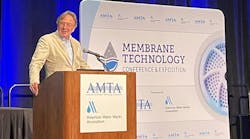ALEXANDRIA, VA, Sept. 14, 2015 -- In response to several communities across the nation seeking new strategies to develop sustainable water supplies, a diverse group of water sector organizations has released a framework to help state regulatory agencies and utilities develop guidelines for safely converting wastewater into municipal drinking water through the emerging practice of direct potable reuse (DPR).
The document, titled "Framework for Direct Potable Reuse,"is the result of a collaborative effort among WateReuse, the American Water Works Association (AWWA), and the Water Environment Federation (WEF), with the support of an independent advisory panel administered by the National Water Research Institute (NWRI).
"The water sector is transforming wastewater treatment into full resource recovery that provides valuable, renewable products," said WEF Executive Director Eileen O'Neill. "This framework will help communities properly vet and consider incorporating DPR into their overall water management strategy."
DPR involves the use of state-of-the art advanced water treatment technologies -- membranes, reverse osmosis and advanced oxidation -- to remove viruses, bacteria, chemicals, and other contaminants that may be present in wastewater. Current state and federal regulations were not developed with today's technologies in mind.
"Until guidelines and regulations are prepared, this framework document can serve as a valuable resource to municipalities, utilities and agencies interested in implementing DPR programs to augment community water supplies," said Melissa Meeker, executive director of the WateReuse Association and Research Foundation.
David LaFrance, CEO of AWWA, added, "Freshwater resources are increasingly at risk in many communities. With many communities seeking to expand their water supply portfolios, this guidance will help ensure that DPR is a safe and viable option."
The Frameworkwas prepared by a panel of seven experts with backgrounds in water and wastewater treatment, water quality policy and regulations, water resource planning, and public health risk assessment.These experts have extensive experience with proposed and existing DPR projects within the U.S. The chair of the panel is George Tchobanoglous, professor emeritus of civil and environmental engineering at the University of California, Davis.
The Frameworkdocument provides a context for DPR, including the costs, benefits, energy requirements, and comparative issues with other water sources and measures. Following this introduction, three key components of a DPR program are examined: (1) regulatory considerations (e.g., measures to mitigate public health risks); (2) technical issues related to the production of advanced treated water; and (3) public support and outreach.
"This document represents the first comprehensive framework for developing guidance for DPR," said Jeff Mosher, executive director of NWRI. "The Panel is to be commended for its effort to pull together so much information into one useful, readily accessible document."
Members of the panel included Panel Chair Tchobanoglous; Joseph Cotruvo of Joseph Cotruvo & Associates; Environmental Engineering Consultant James Crook; Ellen McDonald of Alan Plummer Associates; Adam Olivieri of EOA, Inc.; Andrew Salveson of Carollo Engineers; and R. Shane Trussell of Trussell Technologies, Inc.
See also:
"Battling Water Scarcity: Direct Potable Reuse Poised as Future of Water Recycling"
"WateReuse allocates $6M in funding for 13 new water recycling projects"
###


